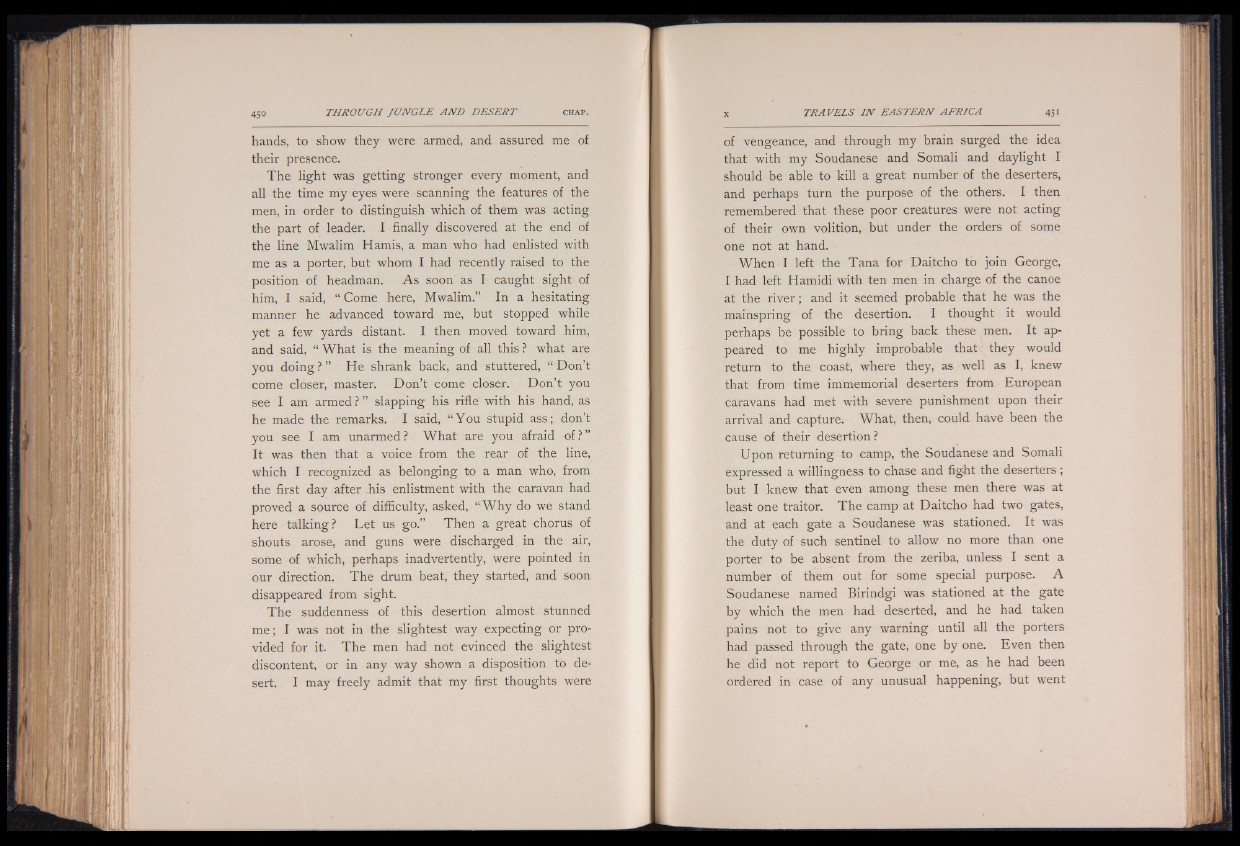
hands, to show they were armed, and assured me of
their presence.
The light was getting stronger every moment, and
all the time my eyes were scanning the features of the
men, in order to distinguish which of them was acting
the part of leader. I finally discovered at the end of
the line Mwalim Hamis, a man who had enlisted with
me as a porter, but whom I had recently raised to the
position of headman. As soon as I caught sight of
him, I said, “ Come here, Mwalim.” In a hesitating
manner he advanced toward me, but stopped while
yet a few yards distant. I then moved toward him,
and said, “ What is the meaning of all this ? what are
you doing?” He shrank back, and stuttered, “ Don’t
come closer, master. Don’t come closer. Don’t you
see I am armed ? ” slapping his rifle with his hand, as
he made the remarks. I said, “ You stupid ass; don’t
you see I am unarmed ? What are you afraid of ? ”
It was then that a voice from the rear of the line,
which I recognized as belonging to a man who, from
the first day after his enlistment with the caravan had
proved a source of difficulty, asked, “Why do we stand
here talking? Let us go.” Then a great chorus of
shouts arose, and guns were discharged in the air,
some of which, perhaps inadvertently, were pointed in
our direction. The drum beat, they started, and soon
disappeared from sight.
The suddenness of this desertion almost stunned
me; I was not in the slightest way expecting or provided
for it. The men had not evinced the slightest
discontent, or in any way shown a disposition to desert.
I may freely admit that my first thoughts were
of vengeance, and through my brain surged the idea
that with my Soudanese and Somali and daylight I
should be able to kill a great number of the deserters,
and perhaps turn the purpose of the others. I then
remembered that these poor creatures were not acting
of their own volition, but under the orders of some
one not at hand.
When I left the Tana for Daitcho to join George,
I had left Hamidi with ten men in charge of the canoe
at the river; and it seemed probable that he was the
mainspring of the desertion. I thought it would
perhaps be possible to bring back these men. It appeared
to me highly improbable that they would
return to the coast, where they, as well as I, knew
that from time immemorial deserters from European
caravans had met with severe punishment upon their
arrival and capture. What, then, could have been the
cause of their desertion?
Upon returning to camp, the Soudanese and Somali
expressed a willingness to chase and fight the deserters;
but I knew that even among these men there was at
least one traitor. The camp at Daitcho had two gates,
and at each gate a Soudanese was stationed. It was
the duty of such sentinel to allow no more than one
porter to be absent from the zeriba, unless I sent a
number of them out for some special purpose. A
Soudanese named Birindgi was stationed at the gate
by which the men had deserted, and he had taken
pains not to give any warning until all the porters
had passed through the gate, one by one. Even then
he did not report to George or me, as he had been
ordered in case of any unusual happening, but went